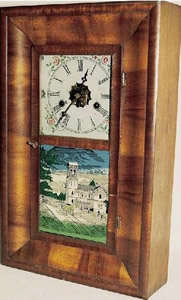Prior to 1831, Elisha Niles Welch (1809-1887) was in business with his father, George, who operated an iron foundry in Bristol. The foundry made weights and bells for clocks. When Elisha Welch formed a partnership with Thomas Barnes Jr., they named the company Barnes &Welch. The firm manufactured wooden-movement shelf clocks and was involved in business with Jonathan C. Brown and Chauncev Pomeroy.
From 1841 to 1849, E. N. Welch partnered with J. C. Brown, who used Forestville Manufacturing Company and J. C. Brown, Bristol, Connecticut, as company names. Chauncey Pomeroy was also a partner in these companies. The two factories manufactured eight-day clocks with brass movements. In 1853, fire destroyed J. C. Brown’s Forestville Hardware and Clock Company.
E. N. Welch mahogany miniature OG, 30-hour, time & strike, original dial & tablet, 12 x 19″ h. $225.
Welch bought Elisha Manross’ failing clock parts business and J. C. Brown’s Forestville company after it went bankrupt. He also purchased Frederick S. Otis’ casemaking business. He consolidated these purchases under one name, E. N. Welch, which became one of Bristol’s largest clock companies. In 1868, the Welch, Spring & Company was formed. It emphasized high-quality clocks, including regulators and calendars. After Elisha Welch’s death in 1887, his son James became the company’s president.
Unfortunately, fire destroyed the movement factor}’ in 1899. Later that same year, the case factor}’ met the same fate. As a result, financial problems plagued the company. Mortgages were past due and bank notes were due and unpaid. Liabilities were growing and legal suits were pending. Realizing the troubles that faced the Welch clockmakers, the Sessions family, who had a clock business in Forestville and were interested in expanding their business, began buying Welch company stock. After Albert L. Sessions became treasurer and W. E. Sessions assumed the presidency, they borrowed over $50,000 to revitalize the company. At this time, the Welch Company ceased to exist, and the name was changed to the Sessions Clock Company.

